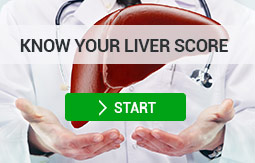What’s in this article
- What is fulminant hepatitis?
- Signs & symptoms
- Diagnosis
- Treatment
What is fulminant hepatitis?
Fulminant hepatitis is a relatively rare type of liver failure that can happen to anyone but specifically those who have been suffering from a chronic liver disease. It can also be referred to as ‘fulminant hepatic failure’ or ‘acute liver failure’ and is a life-threatening disease. Medical attention should be sought if you think you may have liver failure or show any signs. According to The Merck Manual of Diagnosis and Therapy, up to 50% of cases of fulminant hepatitis B involve hepatitis D virus coinfection. Fulminant hepatitis with hepatitis A virus is rare but may be more likely in people with pre-existing liver disorders. Fulminant hepatitis is often caused by:
- An overdose of acetaminophen (an over the counter painkiller)
- Viral hepatitis A,B,C,D,E
- Autoimmune hepatitis
- Some prescription medications (used to treat cancer and some antibiotics)
- Toxins (such as mushroom poisoning)
- Cancer (when tumors spread to the liver)
- Some herbal supplements (kava, ephedra, skullcap and pennyroyal)
- Wilson’s Disease
Signs & symptoms
Signs of fulminant hepatitis are very apparent and manifest in the following ways:
- Rapid health deterioration over days or weeks
- Jaundice
- Nausea
- Changes in behavior or personality
- Excessive bleeding
- Coma
- Liver failure
- Cerebral edema (excess fluid in the brain)
Diagnosis
There are several ways in which a health care professional can diagnose fulminant hepatitis. A liver function test may be performed, or a PT/INR measurement (used to measure excessive bleeding or clotting). Blood and urine tests may also be used as well as scans such as MRI and CT scans. If there is time, your doctor may perform a liver biopsy. A clinical evaluation may be the only assessment needed as sufferers of fulminant hepatitis will deteriorate very quickly.
Treatment
Anyone who is suffering from fulminant hepatitis will most likely be admitted to the hospital’s intensive care unit to be better monitored. If hepatitis is the cause of the liver failure you may be given medications to help with the disease, if autoimmune hepatitis is the cause then steroids may be administered. If your liver failure is due to an overdose of acetaminophen (painkillers), your doctor may give you an antidote called N-acetylcysteine to stop any further damage. This medicine may also be used to treat other causes of acute liver failure. Other types of antidotes can help to reverse the effects of mushroom poisoning and help reduce liver damage.
A liver transplant may be the only treatment available for some cases of acute liver failure. Your doctor will discuss this with you, depending on where you live and the severity of your condition there will be a certain waiting time for a liver donor which can take years. Those who need it most are moved to the top of the list.
Find out more about the basics of liver health with Dr. Tarek Hassanein, M.D.
References
WebMD
MSD Manual
Mayo Clinic

 (442) 244-5115
(442) 244-5115















